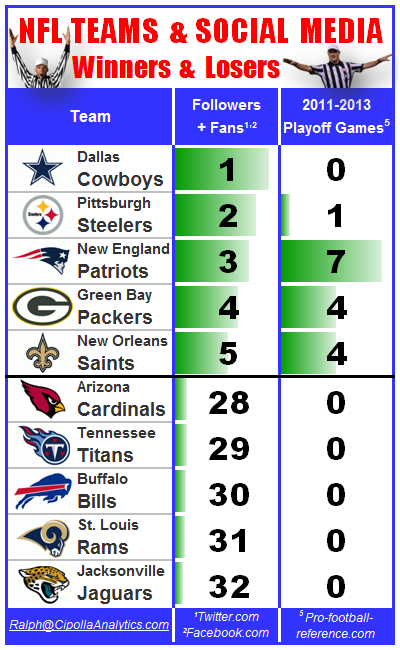
By Ralph Cipolla, {grow} Community Member
We are approaching Super Bowl Sunday here in America … the biggest excuse to eat junk food, drink beer, and celebrate with friends at this time of year!
But even before the big game, we can learn something about winning and losing by comparing our team’s social media presence with on-the-field performance. I wondered if there was any correlation between winning and social media success, and it turns out that there is.
The Pittsburgh Steelers. America’s Team. Also Mark Schaefer’s favorite team. Their logo is featured because it is his blog and he does whatever he bloody wants.
All 32 NFL teams have Twitter and Facebook accounts. Each of these billion-dollar franchises is serious about tearing up the social media turf, but the numbers tell a dramatic story of haves and have-nots.
Why are some so much stronger than others? Let’s take a closer look at the correlation between social media and winning football teams.
The playing field
- Football in America is big business: 34 of the 35 most-watched fall TV shows were NFL games; 205 million Americans watched at least one 2013 regular season game
- 2012 league revenue eclipsed $9 billion
- League marketing efforts are aimed at younger Americans who represent a potential fan-base who could pay for tickets, TV packages, and merchandise for decades to come. For an NFL team, a weak social presence isn’t an option.
The game plan
I wanted to compare social media effectiveness with game performance. I gathered social media statistics for each team as of this week. Data used to determine team rankings:
- Number of Twitter followers, Facebook Page Fans, and Facebook “Talking About” Stats
- Klout Score (an indicator of team content that is being shared)
- Size of local “fan pool” or immediate “sphere of influence” – the population within a 75-mile radius of a team’s location.
- Regular season team winning percentage 2011-2013.
- Playoff appearance stats 2011-2013. The number of seasons a team made the playoffs, total number of playoff games played, and number of playoff wins.
- Finally, the dreaded “drought” factor. The number of years since a team has reached the playoffs and years since a playoff win (painful, yet familiar territory for this Buffalo Bills fan)
Game time results
After further review, the game film seems to point to three common strengths among the league’s top social media performers and three shortcomings shared among the bottom teams.
1) When you win, you win at everything.
The Top 10 social media teams have won 31 of the 47 Super Bowls, and over the last three seasons:
- Nine of the 10 teams have have not had a losing record in those years.
- Eight of the 10 teams made the playoffs at least once and four made the playoffs every year
The Bottom 10 teams hold just three of the 47 Super Bowl trophies. Over the last three seasons:
- Eight of the 10 teams had losing records all three years.
- Only three teams made the playoffs at least once; none have won a single playoff game
2) Your audience size matters
The winners take advantage of an opportunity to convert a large fan base:
- The Top 10 social media teams collectively have more than 85 million people within 75 miles of their stadiums
- They tend to draw fans from a large regional area like The Dallas Cowboys or Green Bay Packers
The social media losers have a smaller fan base:
- The Bottom 10 collectively have just over 36 million people living within a 75-mile radius.
- Tend to draw fans from only a local geographic fan base.
3) The power of an emotional connection
The Top 10 social media teams have a long history and a stable relationship with fans. All Top 10 teams are located in the same city in which the franchise was established³
The Bottom 10 have unstable or even controversial histories with their fans:
- Three teams (Arizona, Tennessee, and St. Louis) “jilted” their fans and relocated to new home cities
- Cleveland “broke off” a relationship with fans by moving to Baltimore, until the brand was re-established years later
- Two teams – Carolina and Jacksonville – were founded in the ‘90s
The post-game show
As a die-hard football fan it was fun to conduct this study and discover the fundamentals of social media success:
- A strong brand that promises “winning” content
- Maximizing opportunities to connect with a large audience
- Building long-term emotional connections
Great teams are not built by gimmicks or fads. Likewise, these social media powerhouses don’t have to rely on buying followers or contests. To build a winning team on the field or in social media you have to work from a strong foundation.
I have some detailed stats about every NFL team so if your favorite team isn’t represented in the chart you can find more data at on my site. Beyond the lesson in fundamentals, is there a data-driven gem of insight among these stats? I’d love to hear your thoughts. Game on.